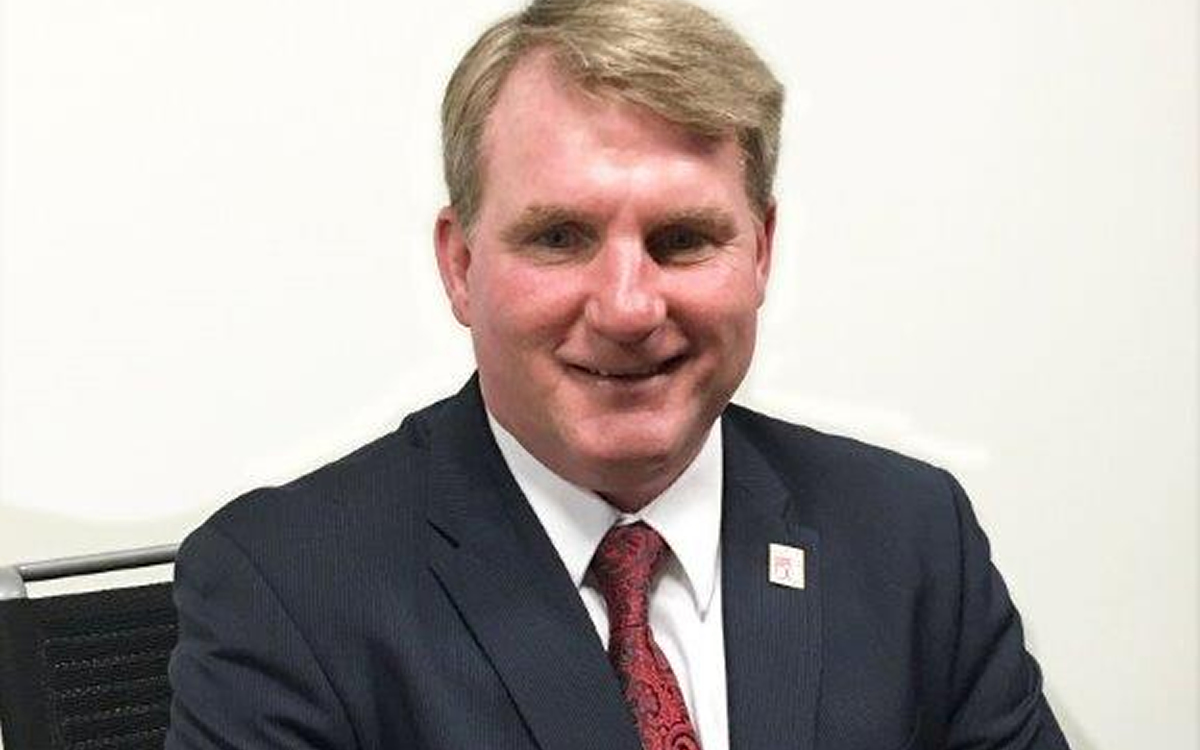Local
Accusations fly as Equality Md. copes with crisis
State group could close; board blames fired director for mismanagement
Equality Maryland will likely lay off its four remaining staff members and could be forced to close if sufficient funds aren’t raised to cover costs, according to its board president, who blames the organization’s former executive director for the crisis.
“We brought in an interim executive director to assess the state of our resources,” said Charles Butler, Equality Maryland’s board president. “She did a rapid assessment and confirmed our fear that Equality Maryland has been perhaps irreparably damaged by the previous executive director.”
Morgan Meneses-Sheets was fired as director last month. Butler claims she entered into expensive contracts on behalf of the organization and hired staff without the board’s approval or knowledge.
“The most serious of the harms that we’re facing now is the depleted financial conditions of the organization, which may require the termination of existing staff due to the financial commitments [Meneses-Sheets] made on the organization’s behalf,” Butler said.
He appealed to the LGBT community in Maryland to step up and save the organization with donations of money and volunteer time.
“Hopefully the LGBT community in Maryland will come together and support the organization financially because otherwise that will leave a void in the state,” he said.
Meneses-Sheets sharply disputed Butler’s accusations and in a candid interview took aim at Equality Maryland’s board and even the state’s eight-member LGBT Caucus.
“I wish he’d be a grown up and allow me to move on,” she said, describing her termination as “a groundless rash decision.”
She denied entering into contracts without the board’s knowledge and claimed she wasn’t authorized to sign anything in the last six months of her tenure without approval. Further, she said she could not pay any bill in excess of $1,000 without approval from the board treasurer.
“We produced monthly reports and there weren’t contracts or liabilities they weren’t aware of, it’s complete nonsense,” Meneses-Sheets said. “Maybe Chuck wasn’t paying attention to the reports but they were generated.”
But a second knowledgeable source, who spoke on condition of anonymity, said Meneses-Sheets agreed to a payment plan with a vendor that included a June 2011 balloon payment in excess of $10,000. The source said Meneses-Sheets did not inform the board of the obligation. In addition, the source claims that Meneses-Sheets brought on four staffers as contractors without the knowledge or consent of the board.
In addition to the accusations of financial mismanagement, Butler said there were other problems with Meneses-Sheets’ performance. He claims she made a controversial decision to remove a public accommodations provision from the state’s gender identity non-discrimination bill without informing the board. That decision riled some transgender activists, who pulled their support for the bill, which ultimately died. Again, Meneses-Sheets denies that she acted unilaterally and said the decision to pull the provision came from the bill’s sponsor, Del. Joseline Pena-Melnyk (D-Prince George’s and Anne Arundel Counties).
“It’s unfortunate that the board chair is pointing fingers,” Meneses-Sheets said. “Board members were consulted … the decision was made by the sponsor and our choice was to support the bill. It’s ridiculous to suggest that I was running around willy-nilly.”
Again, Equality Maryland insiders paint a different picture. The anonymous source said Meneses-Sheets approached national LGBT partner organizations and the bill’s sponsor and “made a deal without board approval or knowledge.” By the time the board found out the public accommodations provision had been stripped, the bill was already being written in Annapolis and it was too late to change it, the source claims.
Butler also claimed that Meneses-Sheets left Equality Maryland’s member and donor database in disarray. He said the database was damaged while merging information from another database but that Meneses-Sheets didn’t inform the board.
“That database is arguably our most valuable material asset,” Butler said, adding that most donor information obtained at the organization’s fall gala that raised $25,000 was lost. He urged Equality Maryland donors to proactively contact the group as some e-mail addresses and phone numbers can’t be found.
Once again, Meneses-Sheets tells a very different story. She claims the database was “a wreck” when she arrived at Equality Maryland and that the new problem surfaced in the fall but that she brought on a volunteer to clean it up and rebuild it.
“Wrong,” the anonymous source said, “she knew the database was damaged and did nothing about it.”
Meneses-Sheets made allegations of her own — that she never had performance reviews, was treated unprofessionally, left the organization with money in the bank and that the board deceived her about the stability of the organization when she was hired. “They were in the red and barely getting by,” she said. Despite the accusations, she said she didn’t contemplate a lawsuit after her departure and never filed for unemployment benefits. She found a new job and now works for Pride at Work.
She claims that the eight-member LGBT Caucus was a “major force in choosing me as the scapegoat.”
“Several sources told me they played a big role in deciding I would be the scapegoat,” she said. “Should the LGBT legislators decide who staffs the LGBT organization? They’ve created an untenable situation where they dictate everything.”
Sources dispute the claim that Equality Maryland was in the red at the time the group hired Meneses-Sheets and insist that she neglected her responsibility to raise funds.
“Her idea of development was to go to happy hours all over the state of Maryland and ask for $5 donations,” the source said. “Her fundraising plan was never more sophisticated than that.”
The flap over Meneses-Sheets’ termination has offered a glimpse into how state LGBT rights groups interact with national groups like the Human Rights Campaign, Freedom to Marry and the Gill Action Fund.
“The shit has hit the fan,” Meneses-Sheets said, “[the board] realizes there are major problems with the LGBT Caucus and that the national groups have their own agendas that have nothing to do with supporting Equality Maryland. They’ve gotten no money and they’re panicking.”
She claims that at the time she left the organization, there were rumors that HRC would keep Equality Maryland out of future efforts to pass a marriage equality bill, following this year’s failed attempt.
Butler confirmed that the national groups are involved in Maryland’s marriage fight. HRC’s regional field director, Sultan Shakir, began working at Equality Maryland’s headquarters office in Baltimore earlier this month.
“HRC is working with local and national groups to help build a strong campaign to pass Equality Maryland’s entire legislative agenda next year,” said HRC spokesperson Fred Sainz. “While HRC currently has a field staffer working in the Baltimore headquarters to support their new executive director, there are no set plans to keep him there,” he said.
Butler said the national groups are working on a campaign field strategy and a plan to combat an anticipated referendum to overturn a same-sex marriage law and that he’s unsure if that effort would be run out of Equality Maryland or be physically located elsewhere. Sainz denied rumors last week that HRC sought to install Shakir as the new Equality Maryland director.
But the marriage struggle in Maryland could be hampered if Equality Maryland is forced to close.
“We need your support, financially and otherwise, we need your involvement,” Butler said. “I’m fairly optimistic we can raise enough funds so that we can keep the organization running. I think we do have a realistic shot at getting the marriage bill and the gender identity bill passed in the next legislative session.”
Assuming the organization can raise funds to cover its expenses, Butler said the next step would be to hire an executive search firm to “find us a competent, strong director.” He said it’s important to work more closely with the community and, to that end, the organization now seeks to expand its board.
District of Columbia
Taste of Point returns at critical time for queer students
BIPOC scholar to speak at Room & Board event on May 2

The Point Foundation will kick off May with its annual Taste of Point DC event. The event will be hosted at Room & Board on 14th Street and feature a silent auction, food tastings, a speech from a scholar, and more.
Point’s chief of staff, Kevin Wright, said that at Taste of Point, the scholars are the star of the show.
“People never come to an event to hear Point staff speak, they come to hear from the people most impacted by the program,” he said. “At its core Taste of Point is designed to center and highlight our scholars’ voices and experiences.”
This year, a Point BIPOC Scholar, Katherine Guerrero Rivera will speak at the event.
“It is a great opportunity to highlight the scholars out there on the front lines making impacts in almost every sector and job field,” Wright said.
Wright pointed out that this year especially is a pivotal time for LGBTQ students.
“In 2023, there were 20 states that passed anti-LGBTQ legislation,” he said. “By this point in [2024] we already have more.”
Wright said the impacts of those legislative attacks are far reaching and that Point is continuously monitoring the impact they have on students on the ground.
Last month, The Washington Post reported that states with anti-LGBTQ laws in place saw school hate crimes quadruple. This report came a month after a non-binary student, Nex Bennedict, died after being attacked at school.
“So, we see this as a critical moment to really step up and help students who are facing these challenges on their campus,” Wright said. “Our mission is to continue to empower our scholars to achieve their full academic and leadership potential.”
This year Point awarded nearly 600 LGBTQ students with scholarships. These include the flagship scholarship, community college scholarship and the BIPOC scholarship. When the foundation started in 2002, there were only eight scholarships awarded.
Dr. Harjant Gill is one of those scholars who said the scholarship was pivotal for him. Gill said he spent his undergraduate years creating films and doing activism for the LGBTQ community.
As a result, his academic record wasn’t stellar and although he was admitted into American University’s graduate program he had no clue how he would fund it.
Upon arrival to American he was told to apply for a Point scholarship and the rest was history.
“It ended up being the one thing that kept me going otherwise I would have dropped out,” he said. “Point was incredibly instrumental in my journey to becoming an academic and a professor.”
More than a decade later, Gill serves on the host committee for Taste of Point and is a mentor to young Point scholars. He said that he donates money yearly to Point and that when he is asked what he wants for a gift he will often tell his friends to donate too.
To attend the event on Wednesday, May 2, purchase tickets at the Point website. If you can’t attend this year’s Taste of Point DC event but would like to get involved, you can also donate online.
District of Columbia
Three of five LGBTQ candidates win race for DNC delegate from D.C.
32 candidates competed for 13 elected seats in party caucus

Three out of five known LGBTQ candidates running for election as delegates from D.C. to the Democratic National Convention won their races at an April 20 Democratic Party caucus election held at D.C.’s Walter Washington Convention Center.
Ward 2 gay Democratic activist John Fanning finished in first place with 140 votes and Ward 8 gay Democratic activist David Meadows finished in second place with 127 votes in a race in which six male candidates committed to supporting President Biden were competing for three male seats in a section of the city designated as Congressional District 1, which included registered Democratic voters in Wards 1, 2, 6, and 8.
Ward 7 gay Democratic activist Jimmie Williams won his race, finishing in third place with 200 votes in a race in which eight male candidates committed to President Biden competed for four male seats in the Congressional District 2 section of the city that included Wards 3, 4, 5, and 7.
Gay Democratic activist Felipe Afanador lost his race, finishing in sixth place with 47 votes in the Congressional District 2 election for male candidates backing Biden. It couldn’t immediately be determined which of the four wards in District 2 he is from.
The Washington Blade didn’t learn about Afanador’s status as an LGBTQ candidate until the Capital Stonewall Democrats announced it one day before the April 20 party election in an email statement.
In the Congressional District 2 race among female candidates, in which eight candidates competed for three female seats, transgender rights advocate and Ward 3 Democratic Party activist Monika Nemeth lost her race, finishing in sixth place with 49 votes.
The five LGBTQ candidates were among 32 candidates competing for just 13 elected delegate positions in D.C. D.C. will have a total of 51 delegates to the Democratic Convention, but the other 38 include elected officials and party leaders who are considered “automatic” or appointed delegates. The Democratic Convention will be held in Chicago Aug. 19-23.
Observers familiar with the April 20 party caucus election said Fanning, Meadows, and Williams had participated in local D.C. Democratic Party events and activities for a longer period than Nemeth and Afanador and appear to have been better known among Democratic voters in their respective wards as well as other wards. Those factors contributed to their receiving significantly more votes than most other candidates, observers have said.
In his candidacy statement posted on the D.C. Democratic Party website, Afanador said he worked on the 2020 Biden presidential election campaign in Pennsylvania. His LinkedIn page says in 2022 he began work in Washington for the Biden administration as an official in the U.S. Department of Agriculture.
Nemeth is a past president of D.C.’s Capital Stonewall Democrats, the city’s largest LGBTQ local political group, and has been an active member of the D.C. Democratic State Committee, the local party governing body. She served as a Biden delegate at the 2020 Democratic National Convention.
“It is important for our D.C. delegation to have strong LGBTQ representation,” Capital Stonewall Democrats said in its April 19 statement. “There are five LGBQ candidates running to be delegate, and Capital Stonewall Democrats asks that our members support each one,” the statement says.
“Unfortunately, they fell short, but they and all queer Democrats are welcome to attend and participate in convention events and activities sponsored by the national and local party,” Meadows told the Blade in referring to Nemeth and Afanador. “Our shared goal is to unite behind the Biden-Harris ticket to protect our LGBTQ rights from being dismantled by Donald Trump and the GOP,” Meadows said.
“Running for District Delegate is one of the most grassroots efforts,” Fanning told the Blade. “It’s very beneficial to align yourself on a slate with community leaders that have either previously run for District Delegate or have developed a constituency in their community from other civic engagements,” he said, referring to possible reasons for his, Meadows, and Williams’s election victory.
Aside from the D.C. elected LGBTQ delegates, two prominent D.C. LGBTQ Democratic leaders will be appointed as delegates to the 2024 Democratic National Convention in their role as members of the Democratic National Committee from D.C. They are Claire Lucas, a highly acclaimed Democratic Party and LGBTQ rights advocate and party fundraiser; and Earl Fowlkes, one of the lead organizers of D.C.’s annual Black LGBTQ Pride celebration and former president of the Capital Stonewall Democrats. Both are committed to supporting President Biden as the Democratic nominee for re-election.

GAITHERSBURG, Md. — Maryland state Del. Joe Vogel (D-Montgomery County) on Friday held a “Big Gay Canvass Kickoff” event at his congressional campaign’s headquarters.
LGBTQ+ Victory Fund Vice President of Outreach and Engagement Marty Rouse and John Klenert, a member of the DC Vote and Victory Fund Campaign board of directors, are among those who participated alongside members of Equality PAC. Vogel spoke before Rouse, Klenert and others canvassed for votes in the area.
“Joe brings a fresh new perspective to politics,” said Gabri Kurtzer-Ellenbogen, deputy field director for Vogel’s campaign.
Vogel, 27, is among the Democrats running for Congressman David Trone’s seat.
Trone last May announced his bid to succeed retiring U.S. Sen. Ben Cardin (D-Md.) in the U.S. Senate.
The Democratic primary is on May 14. Vogel would be the first Latino, the first gay man and first Gen Zer elected to Congress from Maryland if he were to win in November.
“We need a new generation of leadership with new perspectives, new ideas, and the courage to actually deliver for our communities if we want things to get better in this country,” Vogel told the Washington Blade last month during an interview in D.C.
-

 South America3 days ago
South America3 days agoDaniel Zamudio murderer’s parole request denied
-

 Maryland4 days ago
Maryland4 days agoMontgomery County police chief discusses arrest of trans student charged with planned school shooting
-

 Commentary5 days ago
Commentary5 days agoWorld ‘isn’t much different today’
-

 Theater3 days ago
Theater3 days ago‘Amm(i)gone’ explores family, queerness, and faith









